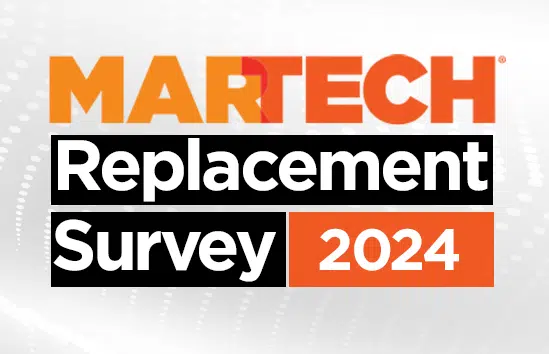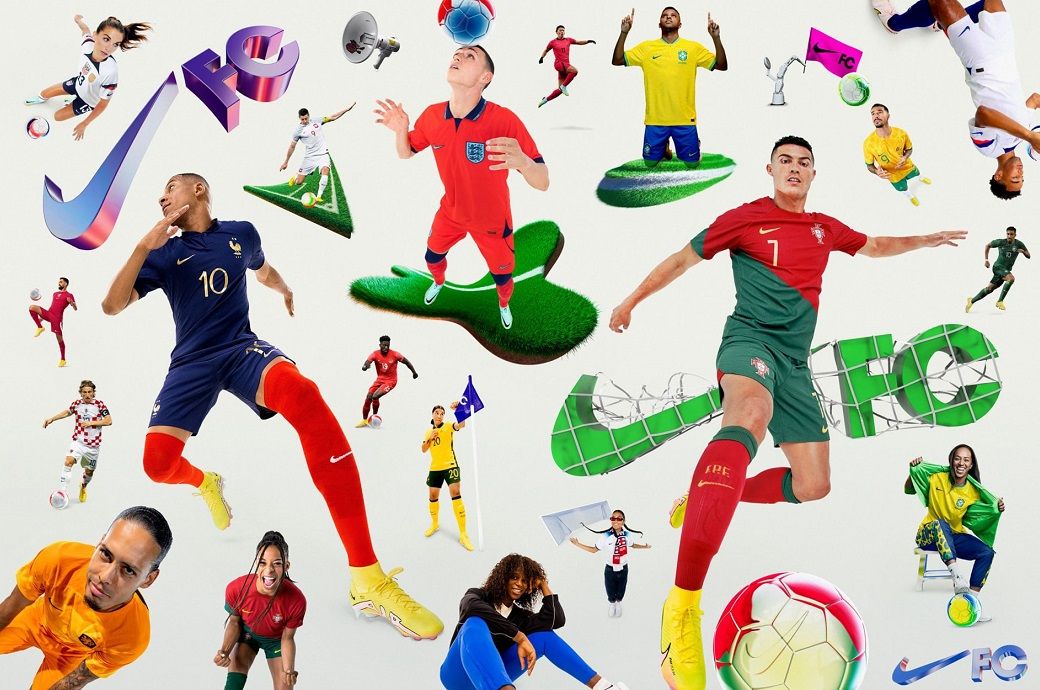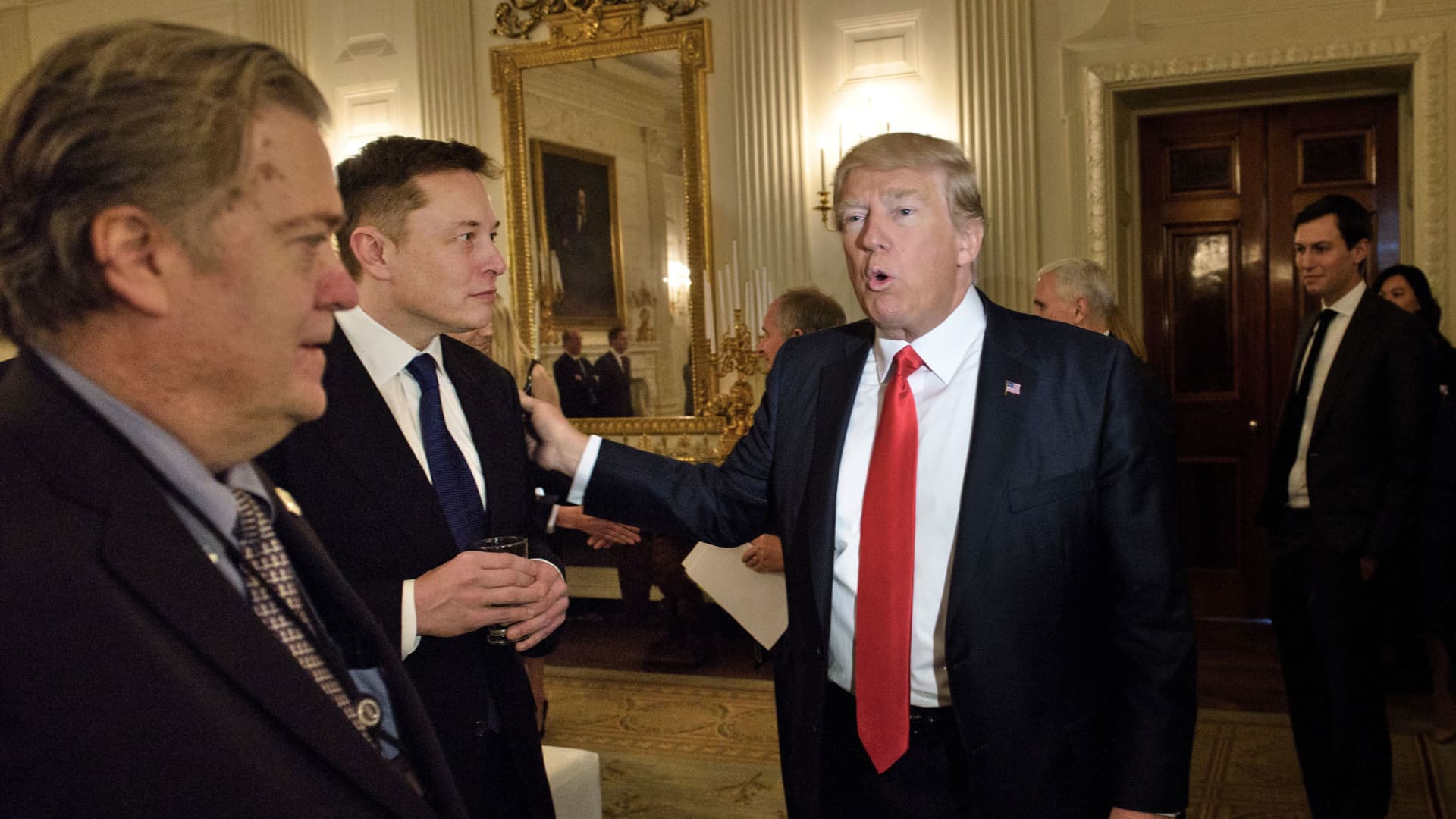The long line of young women curled around the corner from the iconic Casa Magazines store on 8th Avenue in New York City and stretched along West 12th Street. They were there to eat popsicles in the warm sunshine, pick up gift bags from the high-end fashion brand Miu Miu and accept free copies of books Miu Miu selected as “Summer Reads.”
The books were not an afterthought. They represented substantive literary contributions to the empowerment of women, like “A Woman” by Sibilla Aleramo, regarded as Italy’s first feminist novel. Nor was the event a one-off. Miu Miu was staging similar events in Milan, Paris, London, Seoul, Shanghai, Hong Kong and Tokyo.
This was a grand-scale brand activation and we were there to meet Anna Paterlini, co-founder and client director at NEWU, the phygital agency that partnered with Miu Miu to make this happen.
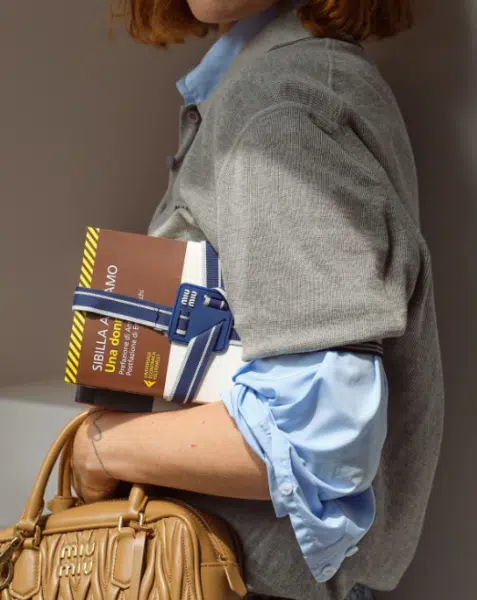
It’s a phygital world
The term “phygital” may not be quite as familiar as “machine learning” or “the cloud,” but it has been around a while. It was coined in 2007 by Chris Weil, co-CEO and founder at Horizon Sports and Experiences and it refers to providing consumers with connected physical and digital experiences. Familiar examples of phygital marketing are the placement of screens in brick-and-mortar stores as well as digital OOH experiences.
NEWU has taken phygital to some remarkable new levels. The Miu Miu activation, Anna explained, had a relatively limited digital component. Fashion-driven social media influencers were deployed to bring the crowds to the activation’s locations. Other examples of NEWU’s work had less expected angles.
- For Peroni Nastro Azurro, a silent disco party with wearables.
- For Airbnb, an Airbnb property in Milan transformed by the placement of digital screens and a physical button passers-by could push to activate the screens and win prizes.
- For Warner Music and Spotify, AI-powered conversations with a digital replica of the singer Achille Lauro.
- For Samsung, the AR experience of creating art (again, for passers-by in the street), the resulting content displayed in real-time on large digital screens.
The list goes on, but for the most part, these are better seen than described.
Meet Poltrona Frau
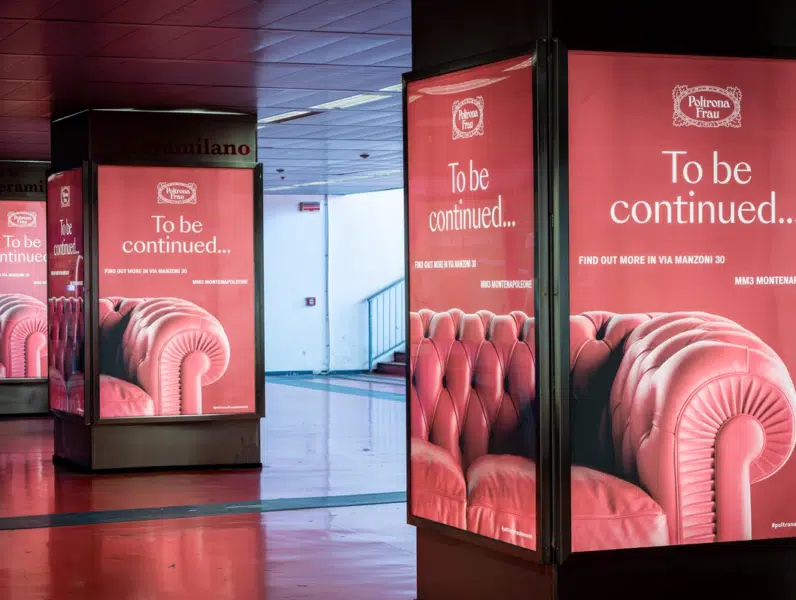

The phygital takeover of Milan Design Week by luxury design brand Poltrona Frau was radical for a business that started as a furniture maker in 1912. If the name Poltrona Frau is not familiar, some of the brands they work with are household names. We asked Leonardo Allasia, Poltrona Frau’s director of global marketing, communications and ecommerce to explain what is now a complex and diversified business.
“The company has three different business units,” he said. “The first is the residential business unit, essentially the manufacture and distribution of accessories and residential furniture, primarily for home and office but for living indoors and outdoors; everything you can imagine except for kitchens and bathrooms.” It creates, he said, a lifestyle experience.
“The second business unit is our custom interiors division,” he continued. They oversee large-scale public space projects, the likes of the Harvard and Yale University theaters, the theater and auditorium that was done for Apple headquarters in California. The European Parliament was one of our most impressive projects. The company has done around 5,000 fully custom large-scale projects — luxury showrooms, hospitality, auditoriums, conference centers, theaters, airport lounges and major office custom projects.”
Finally, there is an “interiors in motion” business. “This oversees the servicing, upholstering and development of interiors in the luxury mobility space. Ferrari is probably the most famous client we’ve been working with for decades; every single Ferrari on the road has an interior developed by Poltrona Frau.” Other clients include Lamborghini, Ducati, Lotus, and Land Rover. This unit also works in first-class and business-class commercial aviation.
It’s relevant that this long-established business has a digital presence, selling not only through its own showrooms and authorized re-sellers but also through an e-commerce business across 14 European markets. Also relevant is a transformation the business is undergoing. “We’re moving from a product-focused offering to an experiential offering. This has led to a desire, from a communications perspective, to think a little bit out of the box.”
The Milan Design Week experience
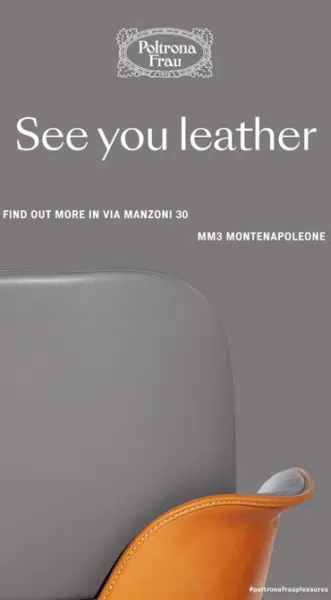

Poltrona Frau sprang out of the box with an extensive OOH activation for Milan Design Week. One intrepid decision, consistent with the transformation of the business was to abandon the product “as the center of the narrative” in favor of less product-focused storytelling (evident in the images reproduced here).
Milan Design Week is an annual event, of course, and when we spoke, Poltrona Frau had just completed its second city takeover through OOH billboards in partnership with NEWU, the agency Allasia had discovered through their OOH campaign for Prada.
“We had to be disciplined not to use a real-life setting to communicate what the brand stands for,” said Allasio. “We had to generate an emotional reaction in a very short time frame and we had absolutely no need to show, in a limited amount of space, everything that we do. The objective was to generate a reaction and drive traffic to our showroom during Design Week.”
One coup in 2023 was a full takeover of the subway stop that takes visitors to the Salone del Mobile, the hub of Design Week. “The message was, go and enjoy your fair, but the most important part is at the flagship store of Poltrona Frau,” explained Paterlini. “This was so effective that they changed the rules about buying that space the following year; a lot of other brands were not happy. That was very good fun.”
In parallel with the OOH experience, NEWU created a mobile strategy using geo-fencing. They deployed a perimeter around the OOH installations within which passers by would get display advertising on their apps (dependent on their privacy settings). The mobile conversation continued in the weeks after the event.
“We broke the rules of the industry,” said Raffaele Bifulco, co-founder and managing director at NEWU, “because never before during Design Week did a design company do something like this. In the past, the advertising was very usual; all the art work was very similar.”
Touching me, touching you
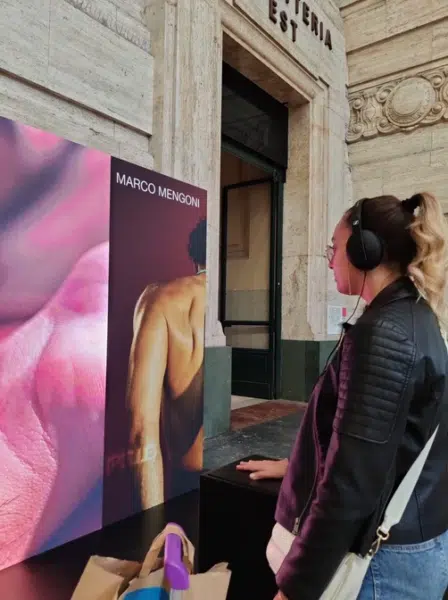

Paterlini agrees that NEWU (“new spaces, new ideas” is their mantra) is looking for opportunities to intervene in unexpected ways. They employ, for example, “trend hunters.” “We do a lot of research and development,” said Paterlini. “We spend time trying out new solutions that might seem challenging and the right partners to work with.” Innovations need not depend on cutting-edge technology; with Poltrona Frau it was the concept that was more innovative.
But there are some technologically remarkable activations in NEWU’s portfolio. I asked Paterlini to tell me about what NEWU did for Amazon Music using haptic technology. The occasion was the launch of the album “Materia (Pelle)” (“Material (Skin)”) by Marco Megoni.
“This came out right after the pandemic and the entire concept of the album was about sensory experiences,” Paterlini explained. “Every single song was inspired by a different sensory experience. Amazon Music wants to position itself as a brand that provides never-before-seen experiences for its customers. We thought that the best way to convey the positioning, but at the same time talk about the album, was to make sure that the sensory landscape that inspired the album came alive.”
NEWU was aware of a start-up that specialized in haptic ecommerce experiences, like being able to touch a bag before buying it through a haptic interface. “We thought it would be great for fans to be able to touch, through the interface, all the things that inspired the album.”
The result was an installation in Milan’s main railway station to coincide with Mengoni’s live appearance in the city. Fans were traveling to Milan for the shows and NEWU expected many of them to funnel through the station.
“The installation consisted of a sort of pillar with a haptic interface for the fan and an LED screen. You had to put on headphones and put your hand on to the sensor. While listening to the songs, you would see the artist touching different things — and you would feel exactly what he felt. The experiences went from simple interactions, like touching a stone or ice, but at one point he touched his body and you could feel his heart beating. That was a very emotional experience.”
“This is the future for us,” said Bifulco. “I don’t want to say that trend hunting is more important than creative direction, but technology goes hand-in-hand with marketing and it’s important to let the two disciplines speak together.”
And of course, the consumers don’t need to understand the technology. “It’s just something that will surprise you,” said Paterlini.
























































![Key Metrics for Social Media Marketing [Infographic] Key Metrics for Social Media Marketing [Infographic]](https://www.socialmediatoday.com/imgproxy/nP1lliSbrTbUmhFV6RdAz9qJZFvsstq3IG6orLUMMls/g:ce/rs:fit:770:435/bG9jYWw6Ly8vZGl2ZWltYWdlL3NvY2lhbF9tZWRpYV9yb2lfaW5vZ3JhcGhpYzIucG5n.webp)




